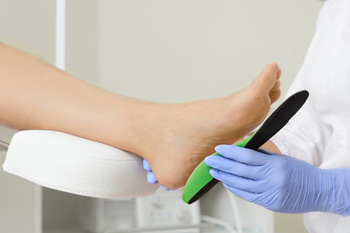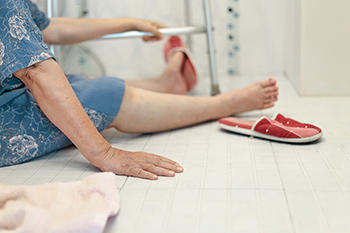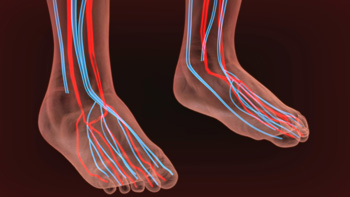Items filtered by date: January 2022
How to Avoid Falling in Your Own Home
Once you reach the age of 65, you are much more likely to fall and suffer a serious injury. With most people in this age group taking a tumble in their own home, it makes sense to keep your own dwelling as safe as possible to avoid “falling” into this category yourself. First, make sure there is an adequate amount of lighting throughout your home. You’ll also want to remove tripping hazards such as clutter, loose rugs, unsecured wires, and unstable furniture. Fix any uneven surfaces in and around your home. Install grab bars in the shower and next to the commode, as well as non-slip mats in the bathroom and kitchen. Keep stairs clear of clutter, make sure the handrails on your stairs are secure and that you use them, and always take your time walking up and down the stairs. Be mindful of your steps and try not to rush around. It is also important to identify any medically related risk factors such as gait abnormalities or other foot conditions that may affect your balance and sure-footedness. Make an appointment with a podiatrist who can offer advice on proper footwear, and fix any foot or ankle conditions that may be compromising your foot health.
Preventing falls among the elderly is very important. If you are older and have fallen or fear that you are prone to falling, consult with one of our podiatrists from Parkwood Podiatry. Our doctors will assess your condition and provide you with quality advice and care.
Every 11 seconds, an elderly American is being treated in an emergency room for a fall related injury. Falls are the leading cause of head and hip injuries for those 65 and older. Due to decreases in strength, balance, senses, and lack of awareness, elderly persons are very susceptible to falling. Thankfully, there are a number of things older persons can do to prevent falls.
How to Prevent Falls
Some effective methods that older persons can do to prevent falls include:
- Enrolling in strength and balance exercise program to increase balance and strength
- Periodically having your sight and hearing checked
- Discuss any medications you have with a doctor to see if it increases the risk of falling
- Clearing the house of falling hazards and installing devices like grab bars and railings
- Utilizing a walker or cane
- Wearing shoes that provide good support and cushioning
- Talking to family members about falling and increasing awareness
Falling can be a traumatic and embarrassing experience for elderly persons; this can make them less willing to leave the house, and less willing to talk to someone about their fears of falling. Doing such things, however, will increase the likelihood of tripping or losing one’s balance. Knowing the causes of falling and how to prevent them is the best way to mitigate the risk of serious injury.
If you have any questions, please feel free to contact our offices located in Brunswick and Hinesville, GA . We offer the newest diagnostic and treatment technologies for all your foot care needs.
Causes and Treatment for Hammertoe in Women
 After years of wearing high heels with pointy toe boxes, or other ill-fitting shoes, many women develop hammertoes in the second and third toe. A raised bump forms on the joint of the toe, which then rubs against the top of your shoe and can become painful. One of the first things you can do to alleviate some of the discomfort is to find shoes that do not aggravate the condition. Look for shoes with a lower heel, wider toe box and softer material on top. It is also a good idea to make an appointment with a podiatrist who can examine your foot and assess the need for orthotics to help align your foot as you walk. This can improve mobility and alleviate pressure around the toes. In some cases, surgery can help to correct the condition. Your podiatrist will be able to determine the best course of treatment for you.
After years of wearing high heels with pointy toe boxes, or other ill-fitting shoes, many women develop hammertoes in the second and third toe. A raised bump forms on the joint of the toe, which then rubs against the top of your shoe and can become painful. One of the first things you can do to alleviate some of the discomfort is to find shoes that do not aggravate the condition. Look for shoes with a lower heel, wider toe box and softer material on top. It is also a good idea to make an appointment with a podiatrist who can examine your foot and assess the need for orthotics to help align your foot as you walk. This can improve mobility and alleviate pressure around the toes. In some cases, surgery can help to correct the condition. Your podiatrist will be able to determine the best course of treatment for you.
Hammertoe
Hammertoes can be a painful condition to live with. For more information, contact one of our podiatrists from Parkwood Podiatry. Our doctors will answer any of your foot- and ankle-related questions.
Hammertoe is a foot deformity that affects the joints of the second, third, fourth, or fifth toes of your feet. It is a painful foot condition in which these toes curl and arch up, which can often lead to pain when wearing footwear.
Symptoms
- Pain in the affected toes
- Development of corns or calluses due to friction
- Inflammation
- Redness
- Contracture of the toes
Causes
Genetics – People who are genetically predisposed to hammertoe are often more susceptible
Arthritis – Because arthritis affects the joints in your toes, further deformities stemming from arthritis can occur
Trauma – Direct trauma to the toes could potentially lead to hammertoe
Ill-fitting shoes – Undue pressure on the front of the toes from ill-fitting shoes can potentially lead to the development of hammertoe
Treatment
Orthotics – Custom made inserts can be used to help relieve pressure placed on the toes and therefore relieve some of the pain associated with it
Medications – Oral medications such as anti-inflammatories or NSAIDs could be used to treat the pain and inflammation hammertoes causes. Injections of corticosteroids are also sometimes used
Surgery – In more severe cases where the hammertoes have become more rigid, foot surgery is a potential option
If you have any questions please contact our offices located in Brunswick and Hinesville, GA . We offer the newest diagnostic and treatment technologies for all your foot and ankle needs.
What Happens During an ABI Test?
An Ankle-Brachial Index (ABI) test is a fast, relatively painless, and non-invasive screening measure used to detect a person’s risk of having peripheral artery disease or other problems with blood flow in the lower limbs. During an ABI test, your doctor will use a blood pressure cuff to measure the blood pressure at various locations along your calves, feet, and toes, as well as at your upper arms. These measures are then used to calculate a ratio that corresponds to your risk of having impaired circulation. You may feel slight, momentary discomfort while your blood pressure is taken, but this test has no other risks or complications associated with it. For more information about ABI tests, please consult with a podiatrist.
Vascular testing plays an important part in diagnosing disease like peripheral artery disease. If you have symptoms of peripheral artery disease, or diabetes, consult with one of our podiatrists from Parkwood Podiatry. Our doctors will assess your condition and provide you with quality foot and ankle treatment.
What Is Vascular Testing?
Vascular testing checks for how well blood circulation is in the veins and arteries. This is most often done to determine and treat a patient for peripheral artery disease (PAD), stroke, and aneurysms. Podiatrists utilize vascular testing when a patient has symptoms of PAD or if they believe they might. If a patient has diabetes, a podiatrist may determine a vascular test to be prudent to check for poor blood circulation.
How Is it Conducted?
Most forms of vascular testing are non-invasive. Podiatrists will first conduct a visual inspection for any wounds, discoloration, and any abnormal signs prior to a vascular test.
The most common tests include:
- Ankle-Brachial Index (ABI) examination
- Doppler examination
- Pedal pulses
These tests are safe, painless, and easy to do. Once finished, the podiatrist can then provide a diagnosis and the best course for treatment.
If you have any questions, please feel free to contact our offices located in Brunswick and Hinesville, GA . We offer the newest diagnostic and treatment technologies for all your foot care needs.
Why Live with Pain and Numbness in Your Feet?
Do You Need Orthotics?
 Shoe inserts that are designed to help relieve pain for a variety of foot conditions (including corns and calluses, tendonitis, bunions, heel pain, and recurring stress fractures) are known as orthotics. Orthotics can be made from various materials, such as rubber, plastic, leather, and in some cases, even metal. Podiatrists often make custom orthotics to treat specific issues. Podiatrists customize orthotics by accounting for the biomechanics of the foot as well as the function and structure of the foot. Patients who are struggling with pain in their feet may wish to consult a podiatrist who can prescribe custom orthotics that are specific to your foot.
Shoe inserts that are designed to help relieve pain for a variety of foot conditions (including corns and calluses, tendonitis, bunions, heel pain, and recurring stress fractures) are known as orthotics. Orthotics can be made from various materials, such as rubber, plastic, leather, and in some cases, even metal. Podiatrists often make custom orthotics to treat specific issues. Podiatrists customize orthotics by accounting for the biomechanics of the foot as well as the function and structure of the foot. Patients who are struggling with pain in their feet may wish to consult a podiatrist who can prescribe custom orthotics that are specific to your foot.
If you are having discomfort in your feet and would like to try orthotics, contact one of our podiatrists from Parkwood Podiatry. Our doctors can provide the care you need to keep you pain-free and on your feet.
What Are Orthotics?
Orthotics are inserts you can place into your shoes to help with a variety of foot problems such as flat feet or foot pain. Orthotics provide relief and comfort for minor foot and heel pain but can’t correct serious biomechanical problems in your feet.
Over-the-Counter Inserts
Orthotics come in a wide variety of over-the-counter inserts that are used to treat foot pain, heel pain, and minor problems. For example, arch supports can be inserted into your shoes to help correct overarched or flat feet, while gel insoles are often used because they provide comfort and relief from foot and heel pain by alleviating pressure.
Prescription Orthotics
If over-the-counter inserts don’t work for you or if you have a more severe foot concern, it is possible to have your podiatrist prescribe custom orthotics. These high-quality inserts are designed to treat problems such as abnormal motion, plantar fasciitis, and severe forms of heel pain. They can even be used to help patients suffering from diabetes by treating foot ulcers and painful calluses and are usually molded to your feet individually, which allows them to provide full support and comfort.
If you are experiencing minor to severe foot or heel pain, it’s recommended to speak with your podiatrist about the possibilities of using orthotics. A podiatrist can determine which type of orthotic is right for you and allow you to take the first steps towards being pain-free.
If you have any questions please contact our offices located in Brunswick and Hinesville, GA . We offer the newest diagnostic and treatment technologies for all your foot and ankle needs.



